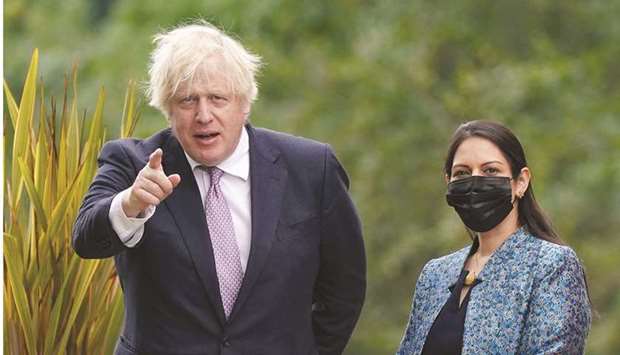British Prime Minister Boris Johnson yesterday said people should not get carried away by six days of better Covid-19 infection data, while one of the country’s top epidemiologists said the end of the pandemic could be just months away.
Johnson has lifted restrictions in England and is betting he can get one of Europe’s largest economies firing again because so many people are now vaccinated, a decision which marks a new chapter in the response to the novel coronavirus.
The number of new daily Covid-19 cases has fallen each day for the last six days, though Johnson stressed the pandemic is not over.
“I’ve noticed obviously that we’re six days into some better figures, but it is very, very important that we don’t allow ourselves to run away with premature conclusions about this,” Johnson told broadcasters, noting it would take a while for the lifting of restrictions in England to feed through to the data.
“People have got to remain very cautious and that remains the approach of the government.”
Imperial College epidemiologist Neil Ferguson said the end of Britain’s pandemic could be just months away as vaccines have so dramatically reduced the risk of hospitalisation and death.
“We’re not completely out of the woods but the equation has fundamentally changed,” Ferguson, whose modelling of the virus’s likely spread at the outset of the pandemic in early 2020 alarmed governments across the world, told the BBC.
Johnson lifted Covid-19 restrictions in England on July 19.
New daily cases in the current wave peaked two days earlier at 54,674 and have since fallen dramatically, to 24,950 new cases on Monday.
The closure of schools for summer, the end of the Euro 2020 soccer championships and warmer weather are among factors epidemiologists say might have reduced social mixing indoors and therefore cases, even as England’s economy has fully reopened.
Case numbers have been falling for longer in Scotland, where the recent peak in cases was on July 1, than in England, corresponding to an earlier elimination from the Euros.
“Both of them seem to coincide in some ways with the end of activity in the Euro 2020 tournament,” Rowland Kao, epidemiologist at the University of Edinburgh, said adding that changes in testing patterns might mean that the sharpness of the drop is overstated in daily testing figures.
“(Cases) may go up again, because we’re only just going to be starting to see the effect of the complete release of restrictions associated with July 19 in England. So there may still be rises yet to come.”
While the number of Covid-19 patients in British hospitals has risen to 5,238, a spike in infections earlier in July has so far not led to a vast increase in deaths, which fell to 14 on Monday.
Britain has one of the highest official death tolls from Covid-19 in the world, with 129,460 deaths, but vaccinations and lockdowns have greatly slowed the rate of deaths since March.
Ferguson said the impact of vaccines on reducing the risk of hospitalisation from Covid-19 had been huge, adding: “I’m positive that by late September, October time we will be looking back at most of the pandemic.

Britain’s Prime Minister Boris Johnson gestures with Home Secretary Priti Patel standing by his side during a visit to Surrey Police headquarters to coincide with the publication of the government’s Beating Crime Plan in Guildford, Surrey, Britain, yesterday.
